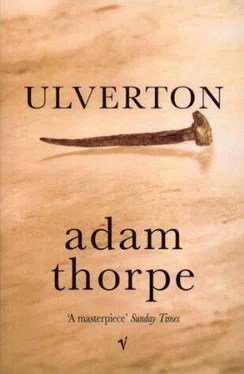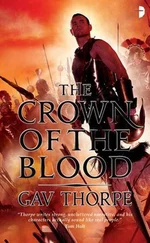‘Yes indeed,’ I ventured. ‘Ahem. What be bad for the hay be good for the termites.’
The effect was unexpected. Cullurne paused a moment, then burst into most uncharacteristic fits of laughter; tears poured from his eyes, and made admirable inroads through the dust and dirt on his cheeks. He slapped the gate, then his knees, and shook his head as the attack subsided, much as he had shaken water from his face in the square. Far from being mortified, I too was affected, and snorted into my fist, my chest heaving in a manner I had not known for months, even years. Eventually I managed to ask him what had been so amiss in my use of local wisdom. Another peal, several repetitions of the saying, each followed by further peals, then a wiping of eyes, a blowing of nose into a greasy rag, a shaking of his head, a brief apology, then the illumination:
‘Turmuts! What be good vor the haay be bad vor the turmuts!’
Inevitably the merriment was resumed, at my picturing of a termite as somehow inextricably countering hay, instead of the common and water-loving turnip, and by the end of this session I was feeling quite weak, but astoundingly well, as if I had walked the downs twice over without a break in my stride.
‘It was Marlers who taught me that,’ I said. ‘I evidently misheard him. Well I do miss him, you know. I miss all of them. Don’t you?’
Cullurne wiped his eyes and grunted. He sucked on his tooth. He sniffed.
‘Silly buggers,’ was all he murmured.
We did not notice the horse even when it had rounded the corner for, as the gate was well tucked into the hedgerow, it had remained half-hidden by the tall bobbing splash-red of mallow and knapweed along the wayside. I was halfway through an observation upon the sterling qualities of young Jimmy Tuck, and the apparent mental collapse of his widowed mother subsequent to his death, when I looked up and saw the bristly face of the Squire just as he was pulling on the reins to stop. I felt a cloud of dust settle grittily in my open mouth, and shut it. He glared at me for a moment then glanced not at Cullurne but at a point about two feet above his head.
‘See about the fence at the bottom of Brambleberry Piece,’ he snapped. (Not quite a true reportage: the name of the field was codified by familiarity into ‘Bram’s’, but I have over the years since joined the two nomenclatures of our village — the official and the non-official — and must take the opportunity to show off my research.)
The Squire then looked back at me with what I can only describe as small eyes, switched at the horse with his crop as though he rather wished my flank were under it, and left us once more in a swirl of dust, thudding into a gallop as the track meandered onto the open downland. Bluebottles clamped themselves without a moment’s hesitation on the fresh dung. Cullurne shrugged at my raised eyebrows.
‘Best see ’bout ut then,’ he said.
‘Well, he was to the point.’ Cullurne nodded and walked off, touching his brow. I watched him for a moment, then turned and left that spot myself; left the foolish nuzzling of the sheep in their feed, the finches scrabbling about the hedgerow, the gold disc of the sun filtering through a thousand leaves as it sank — left that particular place enjoined on that particular evening, in which two forces came together for a moment, bristled, and departed; as if all that is irreconcilable lay not in the far-off thump and whistle and wet of the Aisne, but there, in that golden, English dusk, that glimpse of Attica!
It was, I think, at the beginning of the following week, when I had shoved a ladder into the branches of my apple-tree and was twirling the russets easily off their stems of an evening, that Lock, assigned to a corner of the (by now) vast digging area, clambered up the stepped side of the site and thrust something at Ernest, who almost fell off his canvas stool in fright, for the object in question was a dagger. The Squire, relieving himself against a nearby elm, had scarcely buttoned himself back into decency when Ernest’s excited shriek brought him hurtling back. Lock’s eyes were wide in his small face as he pointed out the exact spot in which the dagger had lain. It was, Ernest stated, of bronze or copper, with a simple triangular blade and a pointed tang to which a wooden hilt would have been tied by twine.
We were each assigned a tiny area and given a brush, of the sort used in watercolour painting — except for Dart, who was told to wield his trowel as far as possible from the rest of us. It was a tedious business, especially as it had rained unexpectedly (though Cullurne’s prediction was to come true) and the soil was wet, gathering into small clods with each stroke. Ernest joined us and it was he, fortunately, who first revealed the hump which stroke by stroke, hour by hour, turned inexorably into the cranium of a buried ancient. I fancied we were painting it into life, and had difficulty in grasping the extraordinary truth of that long sleep — though but a moment in comparison with the aeons of buried Time those rolling chalk hills were witness to, the millions and millions of submerged years my feet compressed each time I walked that turf, the unimaginably lengthy accumulations of centuries that saw the slow sinking of microscopic sea-creatures and the slow rising of their bodily memorial: the same that marked my knees bone-white as I kneeled to my task within the opened barrow. The ancient White Horse, which lay then shrouded in a tangle of bramble on the scarp below us, was but a second old in comparison with the flesh it had once been cut from. The tesserae of the past — Bronze-Age, Roman, mediaeval — thrown up by the coulter are as infant toys to the booming venerableness of the chalk that cradles them. And we — who are we to flail and clamour, to batter and slay, when all that surrounds us tells us of our insignificance, of our infinitesimal capacities, of our inevitable anonymity in the eternal reaches of Time?
But there in our barrow the present peeled back into sufficient ancientness to make every man around me thrill to the sight. The Squire bent down with his mouth open, his pince-nez crooked, his hair stuck upright — the almost comic embodiment of boyish excitement — as the brushes unveiled the eye-sockets, then the nose cavity, and finally the grin of those broken teeth and their slung jaw: as if the face of some horror had broken a calm sea’s surface and rested there. Within a week the outline of the complete skeleton had been sketched, as it were, into view — my own contribution being the right hand and the knees upon which the scattered knuckles rested. From the rim of the barrow, a man’s height above it, the body resembled that of a foetus, legs tucked up towards the chin — except that the head was curiously swivelled round, staring up at the indifferent passage of the clouds.
Walking home one evening that same week, I saw a group of children running excitedly to the low wall that fronted one part of the square, and which penned in a few pigs belonging to several of the villagers — one of whom was Percy Cullurne. I heard the children’s chant before I saw the object of their mockery, and with a shock unravelled the uneven chorus into its component parts:
‘Bid-at-ome, bid-at-ome, bid-at-ome Yeller!
His body en’t o’ steel
But o’ pigeon’s muck an’ feather!’
I was already aware that ‘Yeller’ referred to Percy Cullurne, but the appended verse, repeated vociferously, was new to me. A study should be made of the genesis of these types of incidental or topical verses, as indicating a remarkable degree of creative unanimity, since the progenitor is never to be tracked down, for he almost certainly doesn’t exist. Scraps of popular local rhymes, deeply sunk into every village child’s otherwise unbookish mind, are often found in these new-fashioned and temporary verses, suggesting that the core is adapted and re-used again and again — raided virtually spontaneously. In the above example, the imagery has strong echoes of our Christmas-Tide ‘Mummers’ play about it — ‘muck’ having been substituted for ‘milk’ — although if they had been familiar with their Shakespeare they might have kept with the latter! Recently, with the increased use of our great poets in even the village schools, fragments of Kipling and Walter de la Mare have been spotted, though in a context our educators would no doubt look upon in an unfavourable light.
Читать дальше










